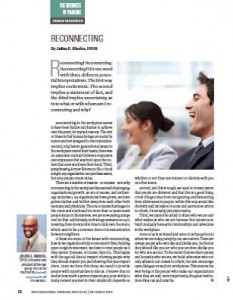Reconnecting! Reconnecting. Reconnecting? It’s one word with three different potential interpretations. The first way implies excitement. The second implies a statement of fact, and the third implies uncertainty, as in to what or with whom am I reconnecting and why?
Reconnecting in the workplace seems to have been harder and harder to achieve over the years, for myriad reasons. The first of these is that human beings are social by nature and not designed to live in isolation. Second, long before generational issues in the workplace reared their heads, there was an unspoken contract between employers and employees that was built upon the notion that one’s word was their bond. Third, paraphrasing former Emerson CEO Chuck Knight, any organization can purchase assets, but only people create value.
There are a number of reasons—or excuses—as to why reconnecting in the workplace has seemed challenging: organizational growth, an era of excess, and technology (surprise!). As organizations have grown, we have gotten further and further away from each other both mentally and physically. The era of excess that began in the 1980s and continued for more than 20 years made people focus on themselves. We are now paying a large cost for that. Additionally, technology ensnares us 24/7, meaning there is very little time to talk over the fence, which used to be a common form of communication between neighbors.
If these are some of the issues with reconnecting, how do we regain the ability to reconnect? First, building upon Knight’s statement, we have to treat people as if they matter (because, of course, they do). This begins with the age-old idea of respect: showing people why they should respect you and showing that you respect them. Once we have this done, we need to provide people with opportunities to like us. I believe that no matter how much a person respects you, your ability to really cement yourself in their minds still depends on whether or not they can connect or identify with you on other levels.
Second, and this is tough, we need to remain aware that people are different and that this is a good thing. Great things come from recognizing and benefitting from differences in people. While this may sound like diversity and inclusion to some and affirmative action to others, it’s actually just plain reality.
Third, we cannot be afraid to share who we are and what makes us who we are because that allows us to build mutually beneficial relationships and advocates in the workplace.
None of us is an island and none of us has gotten to where we are today purely by our own efforts. There are always people who will like and dislike you, but better they should like you for who you are than dislike you for who you are not. To the extent that we share openly and honestly who we are, we build advocates who not only advance our causes to others, but also encourage open dialogue around our workplaces. This ensures the well-being of the people who make our organizations what they are and, more importantly, the great institutions they can and must be.
Julius E. Rhodes, SPHR, is founder and principal of the mpr group. He can be reached at jrhodes@mprgroup.info or 773.548.8037.

